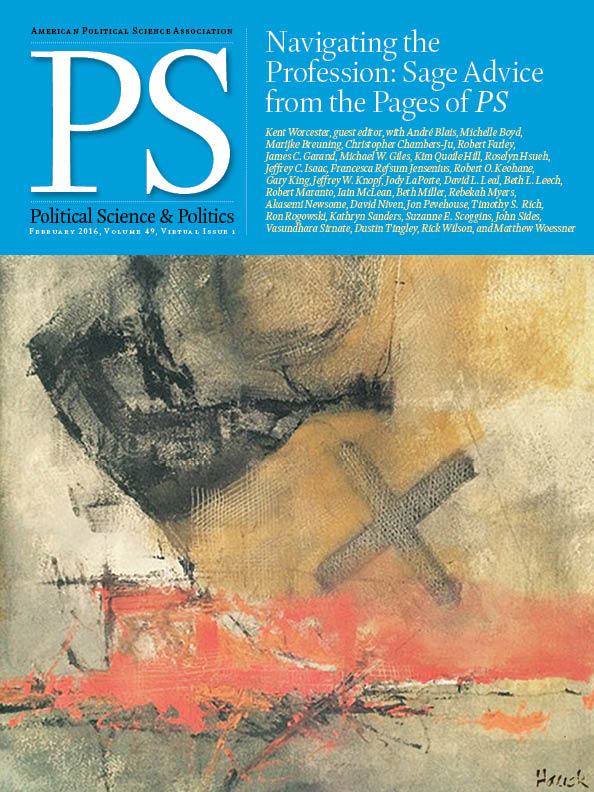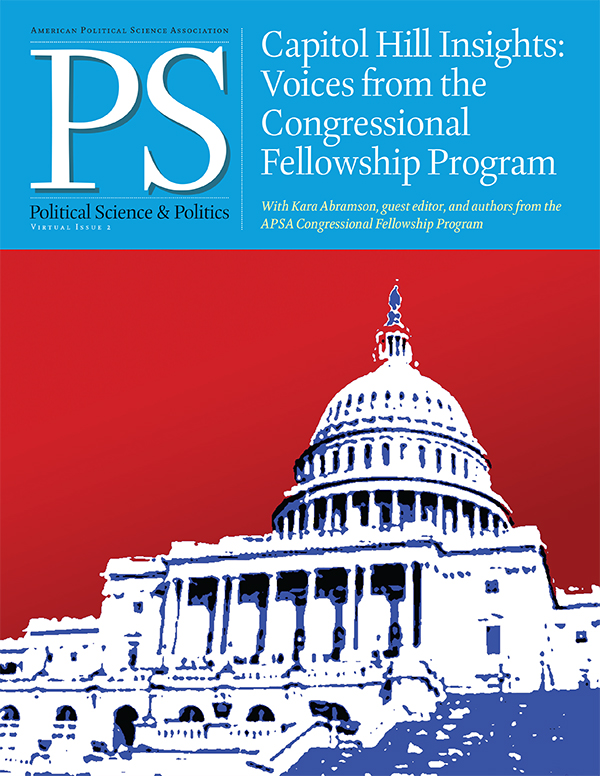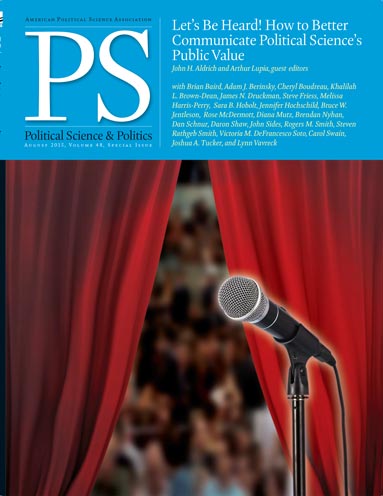APSA is thrilled to offer a new feature to members: virtual issues containing great articles from APSA journals! The association is partnering with Cambridge University Press to offer these new digital packages to members and the public. With this new feature, published articles are grouped together by topic, timeline, or another relation and then published again to reach new audiences and revisit important research. APSA looks forward to releasing multiple virtual issues each year!
A Virtual Review: Gender, Race, Ethnicity, and Diversity in American Political Science Association Publications

As a follow up to the APSA Presidential Task Force Report Political Science in the 21st Century published in 2011, this review by Dianne Pinderhughes and Maryann Kwakwa, University of Notre Dame, serves as a reminder of the report's recommendations and a call for an increased presence of articles that engage issues of race, ethnicity and gender in APSA journals. Specifically the review includes a sample of the diversity related articles found in APSA publications from 1997 to 2015, categorizing the focuses of these articles as follows:
- Diversity
- Race and Ethnicity
- Race and Minority
- Teaching and Learning
- Textbook Portrayal
Read the review's conclusions here!
Navigating the Profession: Sage Advice from the Pages of PS
 This first virtual issue of PS: Political Science & Politics brings together some of the journal’s most highly cited articles about the profession from more than a dozen past issues. This practical material spans numerous topics that especially apply to young scholars. From “ideas and debates” of political science as a vocation, to the “nuts and bolts” of preparing a literature review and publishing as a graduate student, this virtual issue has something both for scholars just beginning their studies and for academics early in their careers. Other topics include:
This first virtual issue of PS: Political Science & Politics brings together some of the journal’s most highly cited articles about the profession from more than a dozen past issues. This practical material spans numerous topics that especially apply to young scholars. From “ideas and debates” of political science as a vocation, to the “nuts and bolts” of preparing a literature review and publishing as a graduate student, this virtual issue has something both for scholars just beginning their studies and for academics early in their careers. Other topics include:
- Restructuring the social sciences
- Navigating the challenges of fieldwork and research design
- Harnessing the potential in blogging and other outreach in the profession and the public
- Becoming a reviewer
- Writing more effectively
- And more!
Read the virtual issue here!
Capitol Hill Insights: Voices from the Congressional Fellowship Program
 The second virtual issue of PS: Political Science & Politics is now available online! Called “Capitol Hill Insights,” the issue features articles written by alumni of APSA’s Congressional Fellowship Program (CFP) and published in PS between 2010 and 2015. Each of the 24 articles pivots to a unique perspective of the fellowship experience, providing rich details and first-hand anecdotes that clarify and explain how Congress and government work.
The second virtual issue of PS: Political Science & Politics is now available online! Called “Capitol Hill Insights,” the issue features articles written by alumni of APSA’s Congressional Fellowship Program (CFP) and published in PS between 2010 and 2015. Each of the 24 articles pivots to a unique perspective of the fellowship experience, providing rich details and first-hand anecdotes that clarify and explain how Congress and government work.
About the Congressional Fellowship Program: Established in 1953, the CFP brings select scholars and professionals to Washington, DC, each year to serve fellowship placements in congressional and other offices. The articles gathered here—written by alumni who are political scientists, journalists, health policy specialists, and other domestic and international professionals—illustrate the unique first-hand insights into Congress and the legislative process provided by the fellowship experience.
Read Capitol Hill Insights today for free here!
Special Issues
Let’s Be Heard! How to Better Communicate Political Science’s Public Value
 Political science is at a crossroads. The knowledge that it produces is more diverse and valuable than ever before—yet many audiences do not understand why or how political science is beneficial. Moreover, the rise of the internet has changed the kinds of information that people seek. For many scholars, the question has become “How do we make our knowledge accessible and relevant to others while still retaining our high standards of scholarship and teaching?”
Political science is at a crossroads. The knowledge that it produces is more diverse and valuable than ever before—yet many audiences do not understand why or how political science is beneficial. Moreover, the rise of the internet has changed the kinds of information that people seek. For many scholars, the question has become “How do we make our knowledge accessible and relevant to others while still retaining our high standards of scholarship and teaching?”
With this question in mind, the American Political Science Association commissioned a Task Force on Public Engagement. Its leaders John H. Aldrich and Arthur Lupia solicited constructive ideas from a diverse group of 21 experienced and knowledgeable academics and public figures. Let’s Be Heard! makes these ideas available to everyone. Because of the topic’s timeliness, the American Political Science Association and Cambridge University Press have agreed to make the special issue available for free at Cambridge Journals Online.
Let’s Be Heard! is organized into three sections: Section I includes in-depth interviews with publicly engaged political scientists and practitioners; Section II examines how to change the profession’s incentives for serving others; and Section III considers new ideas, approaches, and avenues toward broadcasting the value of political science. The contributors contend that political science can offer immense, life changing value to society, but its ability to have this impact depends on its ability to communicate its knowledge effectively. Let’s be heard!
Read the report for free at Cambridge University Press
here and learn more at APSAnet
here!